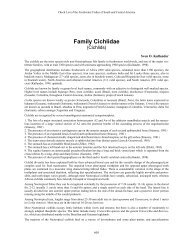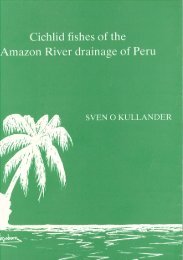Open Access PDF - Sven Kullander
Open Access PDF - Sven Kullander
Open Access PDF - Sven Kullander
Create successful ePaper yourself
Turn your PDF publications into a flip-book with our unique Google optimized e-Paper software.
Ichthyol. Explor. Freshwaters, Vol. 17, No. 4, pp. 289-398, 93 figs., 27 tabs., December 2006<br />
© 2006 by Verlag Dr. Friedrich Pfeil, München, Germany – ISSN 0936-9902<br />
A review of the South American cichlid genus Cichla,<br />
with descriptions of nine new species<br />
(Teleostei: Cichlidae)<br />
Ichthyol. Explor. Freshwaters, Vol. 17, No. 4<br />
<strong>Sven</strong> O. <strong>Kullander</strong>* and Efrem J. G. Ferreira**<br />
Cichla, with the junior synonym Acharnes, is widely distributed in the Amazon, Tocantins, and Orinoco river<br />
basins, and in the smaller rivers draining the Guianas to the Atlantic Ocean. Within South America transplantations<br />
are recorded from the Paraná and Paraguay river drainages in Paraguay and Brazil, and the Paraíba do Sul<br />
and Paraguaçu rivers in Brazil. The genus comprises 15 species recognized by external characters of which colour<br />
pattern and meristics are most significant.<br />
In six species juveniles possess three dark blotches on the side and a dark band connecting the posterior blotch<br />
to the dark blotch at the caudal-fin base: Cichla ocellaris is known from the Guianas, including the Marowijne,<br />
Suriname, Corantijn, Demerara, and Essequibo river drainages, and also the upper Rio Branco in Brazil. Cichla<br />
orinocensis is known from the Negro and Orinoco river drainages in Brazil, Colombia, and Venezuela. Cichla<br />
monoculus is widespread in the floodplains of the Amazon basin, in Colombia, Peru, and Brazil, and also collected<br />
from rivers of Amapá in Brazil, and the lower Oyapock River on the border between Brazil and French<br />
Guiana. Cichla nigromaculata is known from the upper Rio Orinoco in Venezuela and, tentatively, the middle Rio<br />
Negro in Brazil. Cichla kelberi, new species, is restricted to the Tocantins river basin, but also found transplanted<br />
in the Paraná and Paraíba do Sul river drainages and reported from the Nordeste region of Brazil. Cichla pleiozona,<br />
new species, occurs in the Madre de Dios, Beni, and Guaporé river drainages in Bolivia and Brazil, and in<br />
the Rio Jamari in Brazil. A lectotype is fixed for Cychla toucounarai which is a synonym of Cichla monoculus.<br />
Juveniles and young of the remaining nine species, in addition to the three midlateral blotches, possess a dark<br />
horizontal band extending from the head to the dark blotch at the caudal-fin base: Cichla mirianae, new species,<br />
is restricted to the upper Tapajós river drainage, in the Juruena and Teles Pires rivers, and the upper Xingu river<br />
drainage in Brazil. Cichla melaniae, new species, is restricted to the lower Xingu river drainage in Brazil. Cichla<br />
piquiti, new species, is restricted to the Tocantins river basin, but transplanted in the Paraná river basin in Brazil<br />
and Paraguay. Cichla thyrorus, new species, occurs in the Rio Trombetas in Brazil, upstream from the Cachoeira<br />
Porteira. Cichla jariina, new species, occurs in the Rio Jari in Brazil, where it is so far recorded only from the region<br />
of the Santo Antonio rapids. Cichla pinima, new species, occurs in the lower parts of southern tributaries of the<br />
Rio Amazonas in Brazil (Tapajós, Curuá-Una, Xingu), and the lower Tocantins and Capim rivers. Tentatively<br />
identified specimens are recorded from the Amapá, Araguari, and Canumã rivers in Brazil. Cichla pinima occurs<br />
translocated in the Rio Paraguaçu in southeastern Brazil, and is reported as translocated from the northeast of<br />
Brazil. Cichla vazzoleri, new species, occurs in the Uatumã and lower Trombetas rivers in Brazil. Cichla temensis is<br />
known from the Negro and Orinoco river drainages in Brazil, Colombia, and Venezuela. It is also recorded from<br />
blackwater rivers along the Rio Solimões-Amazonas in Brazil (Tefé, Rio Puraquequara, Rio Uatumã, and Silves).<br />
Cichla intermedia is restricted to the Casiquiare and Orinoco river drainages in Venezuela.<br />
* Department of Vertebrate Zoology, Swedish Museum of Natural History, POB 50007, SE-104 05 Stockholm,<br />
Sweden. E-mail: sven.kullander@nrm.se<br />
** Centro de Pesquisas de Biologia Acuatica, INPA, CP 478, 69083-000 Manaus, AM, Brazil.<br />
E-mail: efrem@inpa.gov.br<br />
289




